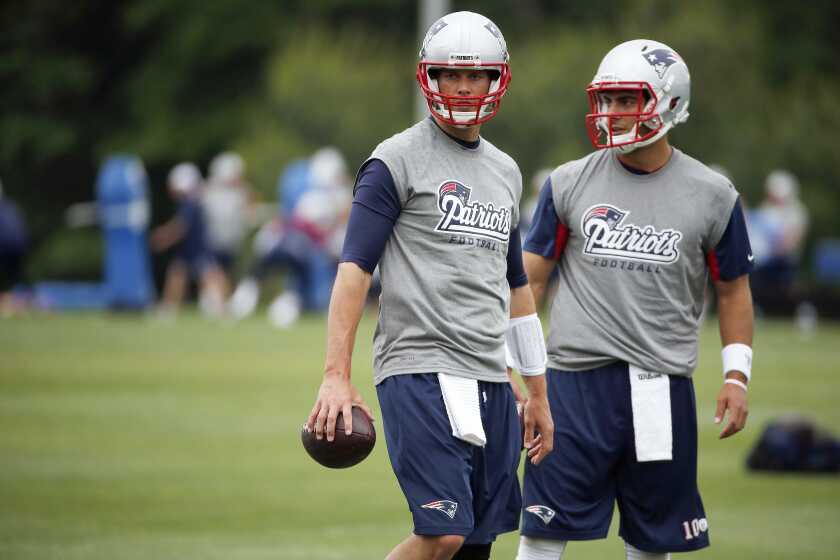MLB looks to women as it aims to further diversify its executive ranks
Megan Schroeder tore up one knee playing basketball in high school and the other one playing flag football in college. Little did she know her days in sports were only beginning.
She studied biomedical engineering at Yale. In graduate school at Northwestern, she did her thesis on how surgically reconstructed knees — like hers — responded to different types of grafts.
She works for the Dodgers now, as one of 15 employees in the team’s fledgling department of research and development. So does Emilee Fragapane, who is among the team of data analysts who helps form the Dodgers’ decisions about which high school players to draft, which minor league players to protect and which major league players to trade and acquire.
In its latest attempt to make baseball’s executive ranks more diverse, the league is emphasizing the recruitment and promotion of women.
Tyrone Brooks, in charge of baseball’s new “pipeline program,” said women represented 13 of the 32 candidates he had placed with teams or the league office in his first year on the job. The Dodgers already had hired Schroeder and Fragapane.
Dodgers manager Dave Roberts, one of 13 officials on a council that advises Brooks and Commissioner Rob Manfred, said he thought a woman could someday serve as a manager or general manager in the major leagues.
“We’re hopeful,” Roberts said. “A woman being a field manager? I think that’s further out. As a general manager, I think that’s obviously something very realistic. That should happen.”
Kim Ng is another of the officials on that advisory council. Ng, a former assistant general manager with the Dodgers and New York Yankees, has long been projected as baseball’s first female general manager.
She has interviewed for a general manager job seven times over the last 12 years — twice with the San Diego Padres, once each with the Dodgers and Angels, and as recently as last winter with the Arizona Diamondbacks.
Ng, the league’s senior vice president of baseball operations, said she has appreciated and enjoyed a “great career” but remains hopeful of landing a general manager job. She also said she believed a woman — if not her, someone else — eventually would be hired as a general manager.
A woman being a field manager? I think that’s further out. As a general manager, I think that’s obviously something very realistic. That should happen.
— Dodgers manager Dave Roberts
“It’s not coming as quickly as anybody who’s interested in the subject wants it to,” she said.
“I wish we, as an industry, were more focused on it. I do think a lot of initiatives where you’re trying to get the underrepresented represented have to come from the top of an organization. They have to be committed to that idea, in order to drive meaningful change.”
Manfred, in his second year in office, says he is committed to the idea that the pool of diverse candidates needs to get younger and larger.
Schroeder, 33, and Fragapane, 25, are the kind of candidates the league hopes to attract and develop.
Schroeder was recruited by Doug Fearing, the Dodgers’ director of research and development, at the annual Sloan Sports Analytics Conference. She said the next frontier of analytics “absolutely” revolves around medical issues; the Dodgers have charged her with applying her biomechanics expertise to data analysis in helping to find ways to keep the best players on the field more often.
Neither Schroeder nor Fragapane said she had experienced any uncomfortable moments with the Dodgers, or a sense that a woman’s place might not be in the front office.
“Everyone has treated me like everyone else,” Schroeder said, “which is exactly what I want.”
Fragapane studied economics as an undergraduate at Sonoma State and on the graduate level at UC Santa Barbara. The Dodgers last year sent her to the league’s scout school, where she was one of two women.
“My aspiration is not to be a scout, but it was a great opportunity,” she said. “It helped augment how we view data and how we view players. We get stuck in the numbers, and it really helps to go talk to people and watch players more. It grants us a flip-side view of things that is really helpful.”
Fragapane declined to say exactly what her aspiration might be.
“Everybody says they want to be a GM,” she said. “I’m not going to give that answer. For me, my interest is to be on the forefront of and making an impact in the new and up-and-coming types of data and technology. I think that stuff is really exciting.”
She said she envisions herself as “a baseball lifer.” So why not say she aspires to become a general manager?
“Because that’s not the ceiling,” she said. “If I don’t make GM someday, it doesn’t mean I’m not going to be happy in the industry. As long as I’m continuing to do work that contributes to the club and that I enjoy, that’s what matters to me.”
Follow Bill Shaikin on Twitter @BillShaikin
More to Read
Go beyond the scoreboard
Get the latest on L.A.'s teams in the daily Sports Report newsletter.
You may occasionally receive promotional content from the Los Angeles Times.











